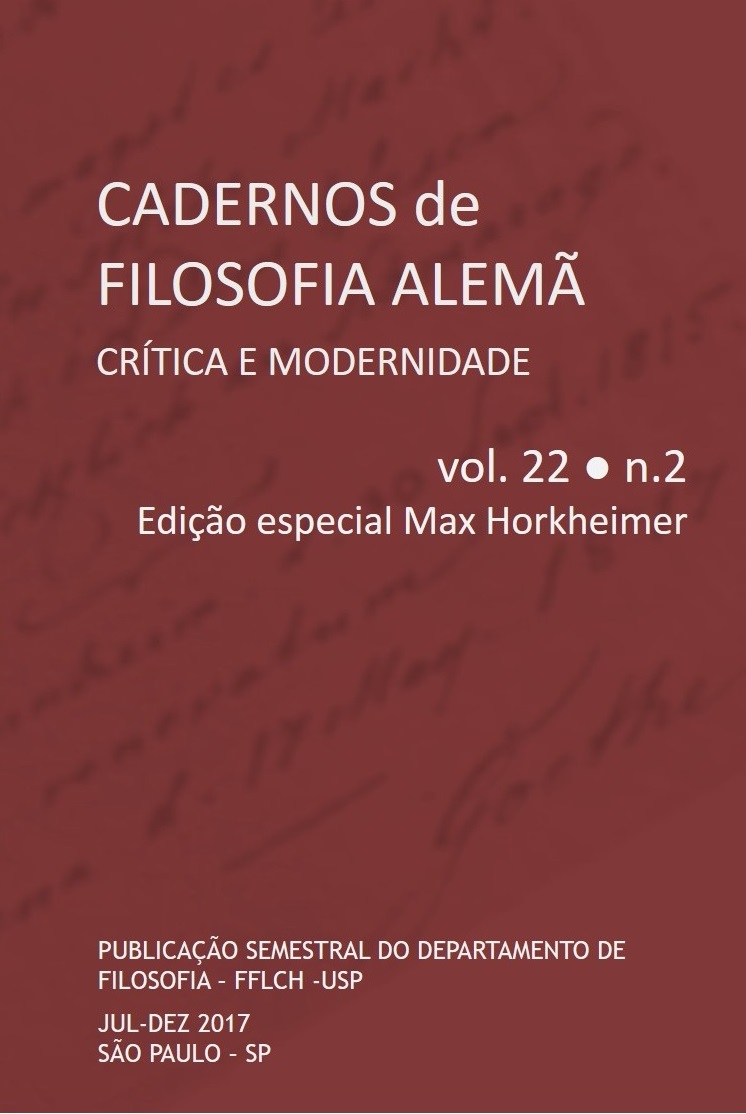The presence of Nietzsche in the intellectual path of Horkheimer
DOI:
https://doi.org/10.11606/issn.2318-9800.v22i2p39-48Keywords:
Horkheimer, Nietzsche, Civilization.Abstract
The present article seeks to indicate the transformations in the approach of Nietzsche's philosophy throughout the intellectual production of Horkheimer until the beginning of the 1940s. In this way, it is possible to perceive that the content of the analyzes of Nietzsche also changes in the measure in which his philosophy is opposed to the Marxism, that in this movement arises with significant loss of its capacity of explanation of the reality.Downloads
References
Arato, A. e Gebhardt, E. (orgs.). (1993). The essential Frankfurt School reader. New York: Continuum.
Chaves, E., (2010) “Não se pode falar de Nietzsche, sem relacioná-lo claramente à atualidade”. O Nietzsche “francês” nas páginas da Zeitschrift für Sozialforschung. Cadernos de Filosofia Alemã , 16, pp.147-165.
Habermas, J. (1986). „Bemerkungen zur Entwicklunggeschichte des Horkheimerschen Werkes“. In: Schmidt, A. & Altwicker, N. (orgs.) Max Horkheimer heute: Werk und Wirkung. Frankfurt am Main: Fischer.
____________. (s/d.). Textos e contextos. Tradução de Sandra Luippert Vieira. Lisboa: Instituto Piaget.
____________. (2007). Observações sobre o desenvolvimento da obra de Max Horkheimer. Tradução de Maurício Chiarello. Educação e Filosofia, 21(42), pp.273-293.
Horkheimer, M, (1987 – 1996). Gesammelte Schriften. 19 Bände. Frankfurt am Main: Fischer.
____________. (1993). “The end of reason”. In: Arato, A. e Gebhardt, E. (orgs.). The essential Frankfurt School reader. New York: Continuum.
____________. (2006). Teoria crítica I. Tradução de Hilde Cohn. São Paulo: Editora Perspectiva.
Nietzsche, F. (1988). Kritische Studienausgabe. Vol. 10. Berlin: Walter de Gruyter.
Reijen, W., Noerr, G. (orgs.). (1987). Vierzig Jahre Flaschenpost: Dialetik der Aufklärung 1947 bis 1987. Frankfurt am Main: Fischer.
Wiggershaus, R. (2002). A escola de Frankfurt. História, desenvolvimento teórico, significação política. Tradução de Lilyane Deroche-Gurgel e Vera de Azambuja Harvey. Rio de Janeiro: Difel.
Downloads
Published
Issue
Section
License
Information and conceptions on the texts are complete responsibility of the authors.
All the articles submitted before July 5th 2018 and those published after July 2021 are licensed under a CC BY-NC-ND license – except those published between the aforementioned dates, which are under the CC BY-NC-SA license. The permission for the translation of the material published under the license CC BY-NC-ND by third parts can be obtained with the consent of the author.
Open access policies - Diadorim
Rules applied before July 5th 2018:
Presenting a submission to our Editorial Board implies granting priority of publication for “Cadernos de filosofia alemã”, as well as transferring the copyright of texts (once published), which will be reproduced only with the manifest authorization of the editors. Authors keep the right to reuse the texts published in future editions of their work, without paying any fees to "Cadernos”. We will not grant the permission to re-edit or translate the texts for third parts without agreement of the author.


